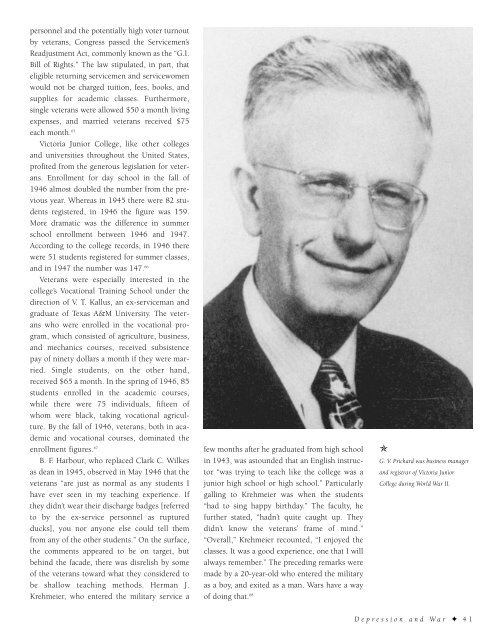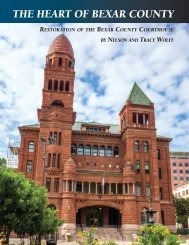The Victoria College, 1925-2000: A Tradition of Excellence
A history of the Victoria College of Victoria, Texas, published to commemorate the institution's 75th anniversary.
A history of the Victoria College of Victoria, Texas, published to commemorate the institution's 75th anniversary.
- No tags were found...
Create successful ePaper yourself
Turn your PDF publications into a flip-book with our unique Google optimized e-Paper software.
personnel and the potentially high voter turnout<br />
by veterans, Congress passed the Servicemen’s<br />
Readjustment Act, commonly known as the “G.I.<br />
Bill <strong>of</strong> Rights.” <strong>The</strong> law stipulated, in part, that<br />
eligible returning servicemen and servicewomen<br />
would not be charged tuition, fees, books, and<br />
supplies for academic classes. Furthermore,<br />
single veterans were allowed $50 a month living<br />
expenses, and married veterans received $75<br />
each month. 65<br />
<strong>Victoria</strong> Junior <strong>College</strong>, like other colleges<br />
and universities throughout the United States,<br />
pr<strong>of</strong>ited from the generous legislation for veterans.<br />
Enrollment for day school in the fall <strong>of</strong><br />
1946 almost doubled the number from the previous<br />
year. Whereas in 1945 there were 82 students<br />
registered, in 1946 the figure was 159.<br />
More dramatic was the difference in summer<br />
school enrollment between 1946 and 1947.<br />
According to the college records, in 1946 there<br />
were 51 students registered for summer classes,<br />
and in 1947 the number was 147. 66<br />
Veterans were especially interested in the<br />
college’s Vocational Training School under the<br />
direction <strong>of</strong> V. T. Kallus, an ex-serviceman and<br />
graduate <strong>of</strong> Texas A&M University. <strong>The</strong> veterans<br />
who were enrolled in the vocational program,<br />
which consisted <strong>of</strong> agriculture, business,<br />
and mechanics courses, received subsistence<br />
pay <strong>of</strong> ninety dollars a month if they were married.<br />
Single students, on the other hand,<br />
received $65 a month. In the spring <strong>of</strong> 1946, 85<br />
students enrolled in the academic courses,<br />
while there were 75 individuals, fifteen <strong>of</strong><br />
whom were black, taking vocational agriculture.<br />
By the fall <strong>of</strong> 1946, veterans, both in academic<br />
and vocational courses, dominated the<br />
enrollment figures. 67<br />
B. F. Harbour, who replaced Clark C. Wilkes<br />
as dean in 1945, observed in May 1946 that the<br />
veterans “are just as normal as any students I<br />
have ever seen in my teaching experience. If<br />
they didn’t wear their discharge badges [referred<br />
to by the ex-service personnel as ruptured<br />
ducks], you nor anyone else could tell them<br />
from any <strong>of</strong> the other students.” On the surface,<br />
the comments appeared to be on target, but<br />
behind the facade, there was disrelish by some<br />
<strong>of</strong> the veterans toward what they considered to<br />
be shallow teaching methods. Herman J.<br />
Krehmeier, who entered the military service a<br />
few months after he graduated from high school<br />
in 1943, was astounded that an English instructor<br />
“was trying to teach like the college was a<br />
junior high school or high school.” Particularly<br />
galling to Krehmeier was when the students<br />
“had to sing happy birthday.” <strong>The</strong> faculty, he<br />
further stated, “hadn’t quite caught up. <strong>The</strong>y<br />
didn’t know the veterans’ frame <strong>of</strong> mind.”<br />
“Overall,” Krehmeier recounted, “I enjoyed the<br />
classes. It was a good experience, one that I will<br />
always remember.” <strong>The</strong> preceding remarks were<br />
made by a 20-year-old who entered the military<br />
as a boy, and exited as a man. Wars have a way<br />
✯<br />
G. V. Prichard was business manager<br />
and registrar <strong>of</strong> <strong>Victoria</strong> Junior<br />
<strong>College</strong> during World War II.<br />
<strong>of</strong> doing that. 68 Depression and War ✦ 41















